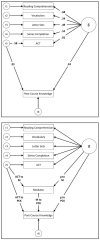The ACT Predicts Academic Performance-But Why?
- PMID: 36662139
- PMCID: PMC9865667
- DOI: 10.3390/jintelligence11010009
The ACT Predicts Academic Performance-But Why?
Abstract
Scores on the ACT college entrance exam predict college grades to a statistically and practically significant degree, but what explains this predictive validity? The most obvious possibility is general intelligence-or psychometric "g". However, inconsistent with this hypothesis, even when independent measures of g are statistically controlled, ACT scores still positively predict college grades. Here, in a study of 182 students enrolled in two Introductory Psychology courses, we tested whether pre-course knowledge, motivation, interest, and/or personality characteristics such as grit and self-control could explain the relationship between ACT and course performance after controlling for g. Surprisingly, none could. We speculate about what other factors might explain the robust relationship between ACT scores and academic performance.
Keywords: ACT; academic achievement; general intelligence; personality.
Conflict of interest statement
The authors declare no conflict of interest.
Figures

References
-
- Ackerman Phillip L., Kanfer Ruth. Cognitive, affective, and conative aspects of adult intellect within a typical and maximal performance framework. In: Dai David Y., Sternberg Robert J., editors. Motivation, Emotion, and Cognition. Routledge; London: 2004. pp. 133–56.
-
- ACT Technical Manual. 2017. [(accessed on 20 December 2022)]. Available online: http://www.act.org/content/dam/act/unsecured/documents/ACT_Technical_Man....
-
- College Scorecard Data. [(accessed on 20 December 2022)]; n.d. Available online: https://collegescorecard.ed.gov/data/
-
- Costa Paul T., McCrae Robert R. Four ways five factors are basic. Journal of Personality and Individual Differences. 1992;13:653–65. doi: 10.1016/0191-8869(92)90236-I. - DOI
LinkOut - more resources
Full Text Sources
Miscellaneous

